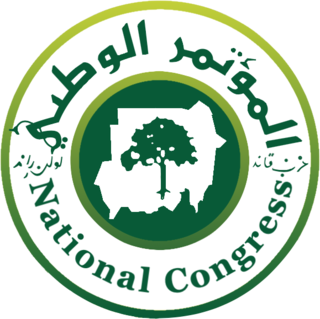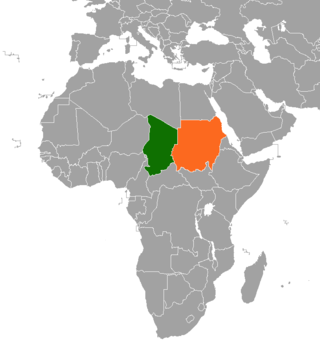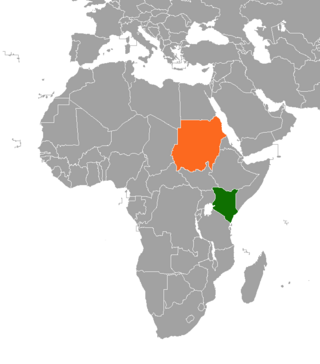| |||||
| Decades: | |||||
|---|---|---|---|---|---|
| See also: | |||||
Events in the year 2010 in Chad .
| |||||
| Decades: | |||||
|---|---|---|---|---|---|
| See also: | |||||
Events in the year 2010 in Chad .

Currently, the politics of Sudan takes place in the framework of a federal provisional government. Previously, a president was head of state, head of government, and commander-in-chief of the Sudanese Armed Forces in a de jure multi-party system. Legislative power was officially vested in both the government and in the two chambers, the National Assembly (lower) and the Council of States (higher), of the bicameral National Legislature. The judiciary is independent and obtained by the Constitutional Court. However, following a deadly civil war and the still ongoing genocide in Darfur, Sudan was widely recognized as a totalitarian state where all effective political power was held by President Omar al-Bashir and his National Congress Party (NCP). However, al-Bashir and the NCP were ousted in a military coup which occurred on April 11, 2019. The government of Sudan was then led by the Transitional Military Council or TMC. On 20 August 2019, the TMC dissolved giving its authority over to the Sovereignty Council of Sudan, who were planned to govern for 39 months until 2022, in the process of transitioning to democracy. However, the Sovereignty Council and the Sudanese government were dissolved in October 2021.

Omar Hassan Ahmad al-Bashir is a Sudanese former military officer and politician who served as Sudan's head of state under various titles from 1989 until 2019, when he was deposed in a coup d'état. He was subsequently incarcerated, tried and convicted on multiple corruption charges. He came to power in 1989 when, as a brigadier general in the Sudanese Army, he led a group of officers in a military coup that ousted the democratically elected government of prime minister Sadiq al-Mahdi after it began negotiations with rebels in the south; he subsequently replaced President Ahmed al-Mirghani as head of state. He was elected three times as president in elections that have been under scrutiny for electoral fraud. In 1992, al-Bashir founded the National Congress Party, which remained the dominant political party in the country until 2019. In March 2009, al-Bashir became the first sitting head of state to be indicted by the International Criminal Court (ICC), for allegedly directing a campaign of mass killing, rape, and pillage against civilians in Darfur. On 11 February 2020, the Government of Sudan announced that it had agreed to hand over al-Bashir to the ICC for trial.

The National Congress Party was a major political party of ousted President Omar Al-Bashir, it dominated domestic politics in Sudan from its foundation until it was dissolved following the Sudanese Revolution.

This article covers the period of the history of Sudan between 1985 and 2019 when the Sudanese Defense Minister Abdel Rahman Swar al-Dahab seized power from Sudanese President Gaafar Nimeiry in the 1985 Sudanese coup d'état. Not long after, Lieutenant General Omar al-Bashir, backed by an Islamist political party, the National Islamic Front, overthrew the short lived government in a coup in 1989 where he ruled as President until his fall in April 2019. During Bashir's rule, also referred to as Bashirist Sudan, or as they called themselves the al-Ingaz regime, he was re-elected three times while overseeing the independence of South Sudan in 2011. His regime was criticized for human rights abuses, atrocities and genocide in Darfur and allegations of harboring and supporting terrorist groups in the region while being subjected to United Nations sanctions beginning in 1995, resulting in Sudan's isolation as an international pariah.

The International Criminal Court has opened investigations in Afghanistan, the Central African Republic, Côte d'Ivoire, Darfur in Sudan, the Democratic Republic of the Congo, Kenya, Libya, Uganda, Bangladesh/Myanmar, Palestine, the Philippines, and Venezuela. Additionally, the Office of the Prosecutor conducted preliminary examinations in situations in Bolivia, Colombia, Guinea, Iraq / the United Kingdom, Nigeria, Georgia, Honduras, South Korea, Ukraine and Venezuela. Preliminary investigations were closed in Gabon; Honduras; registered vessels of Comoros, Greece, and Cambodia; South Korea; and Colombia on events since 1 July 2002.

The War in Darfur, also nicknamed the Land Cruiser War, was a major armed conflict in the Darfur region of Sudan that began in February 2003 when the Sudan Liberation Movement (SLM) and the Justice and Equality Movement (JEM) rebel groups began fighting against the government of Sudan, which they accused of oppressing Darfur's non-Arab population. The government responded to attacks by carrying out a campaign of ethnic cleansing against Darfur's non-Arabs. This resulted in the death of hundreds of thousands of civilians and the indictment of Sudan's president, Omar al-Bashir, for genocide, war crimes, and crimes against humanity by the International Criminal Court.

While there is a consensus in the international community that ethnic groups have been targeted in Darfur and that crimes against humanity have therefore occurred, there has been debate in some quarters about whether genocide has taken place there. In May 2006, the International Commission of Inquiry on Darfur organized by United Nations "concluded that the Government of the Sudan has not pursued a policy of genocide ... [though] international offences such as the crimes against humanity and war crimes that have been committed in Darfur may be more serious and heinous than genocide." Eric Reeves, a researcher and frequent commentator on Darfur, has questioned the methodology of the commission's report.
Events from the year 2007 in Chad.

The populations of eastern Chad and western Sudan established social and religious ties long before either nation's independence, and these remained strong despite disputes between governments. In recent times, relations have been strained due to the conflict in Darfur and a civil war in Chad, which both governments accuse the other of supporting.

Sudan–United Kingdom relations are foreign relations between Sudan and the United Kingdom. Sudan has an embassy in London whilst the United Kingdom has an embassy in Khartoum. Most of the recent relations between the two countries centre on the region of Darfur.

The International Criminal Court investigation in Darfur or the situation in Darfur is an ongoing investigation by the International Criminal Court (ICC) into criminal acts committed during the War in Darfur. Although Sudan is not a state party to the Rome Statute, the treaty which created the ICC, the situation in Darfur was referred to the ICC's Prosecutor by the United Nations Security Council in 2005. As of June 2019, five suspects remained under indictment by the court: Ahmed Haroun, Ali Kushayb, Omar al-Bashir, Abdallah Banda and Abdel Rahim Mohammed Hussein. Charges against Bahar Abu Garda were dropped on the basis of insufficient evidence in 2010 and those against Saleh Jerbo were dropped following his death in 2013. In mid-April 2019, Haroun, al-Bashir and Hussein were imprisoned in Sudan as a result of the 2019 Sudanese coup d'état. In early November 2019, the Forces of Freedom and Change (FFC) and Sudanese Prime Minister Abdalla Hamdok stated that al-Bashir would be transferred to the ICC. One of the demands of the displaced people of Darfur visited by Hamdok prior to Hamdok's statement was that "Omar Al Bashir and the other wanted persons" had to be surrendered to the ICC.
The following lists events that happened during 2006 in Sudan.
The following lists events that happened during 2007 in Sudan.

Kenya–Sudan relations are bilateral relations between Kenya and Sudan. The two nations maintain ties in various areas, primarily in the security sector.

The Darfur genocide was the systematic killing of ethnic Darfuri people during the War in Darfur. The genocide, which was carried out against the Fur, Masalit and Zaghawa ethnic groups, led the International Criminal Court (ICC) to indict several people for crimes against humanity, rape, forced transfer and torture. An estimated 200,000 people were killed between 2003 and 2005.
A coup d'état took place in Sudan in the late afternoon on 11 April 2019, when President Omar al-Bashir was overthrown by the Sudanese Armed Forces after popular protests demanded his departure. At that time, the army, led by Ahmed Awad Ibn Auf, toppled the government and National Legislature and declared a state of emergency in the country for a period of 3 months, followed by a transitional period of two years before an agreement was reached later.
The 2019–2022 Sudanese protests were street protests in Sudan which began in mid-September 2019, during Sudan's transition to democracy, about issues which included the nomination of a new Chief Justice and Attorney General, the killing of civilians by the Rapid Support Forces (RSF), the toxic effects of cyanide and mercury from gold mining in Northern state and South Kordofan, opposition to a state governor in el-Gadarif and to show trials of Sudanese Professionals Association (SPA) coordinators, and advocating the dismissal of previous-government officials in Red Sea, White Nile, and South Darfur. The protests follow the Sudanese Revolution's street protests and civil disobedience of the early September 2019 transfer of executive power to the country's Sovereignty Council, civilian prime minister Abdalla Hamdok, and his cabinet of ministers. Hamdok described the 39-month transition period as defined by the aims of the revolution.
The following lists events that happened during 2020 in Sudan.
Events in the year 2011 in Chad.